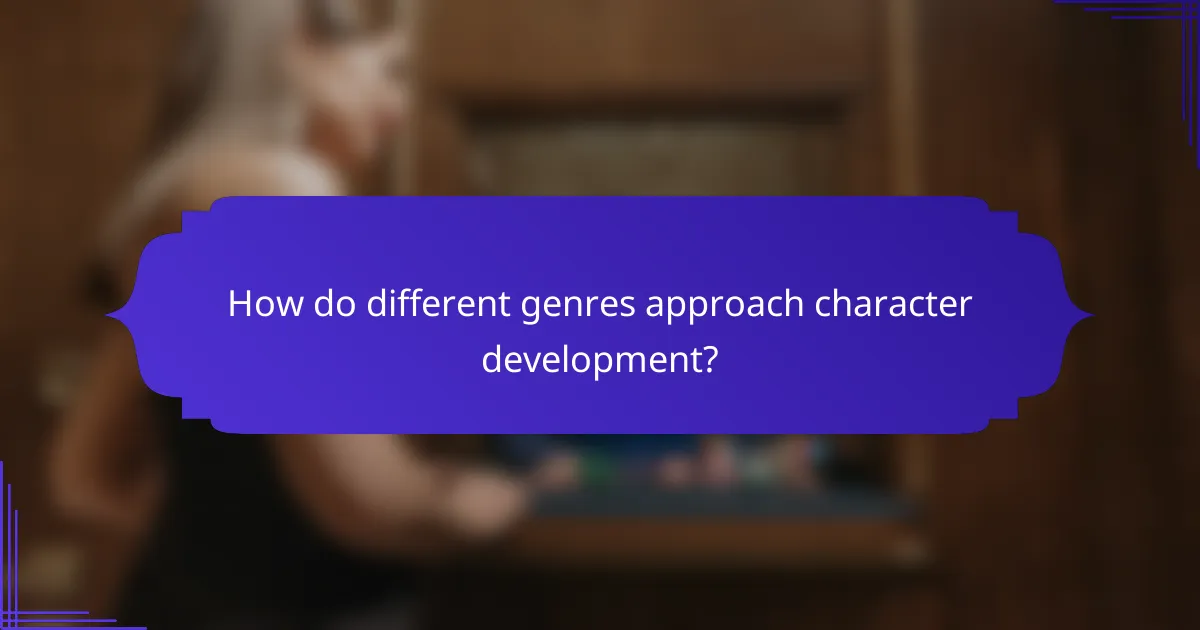Character development enhances emotional depth and player engagement in interactive narratives. It influences player choices and shapes unique character arcs. Different genres employ varied techniques to deepen connections. Understanding common pitfalls can improve character growth and player impact.

How does character development enhance emotional depth in interactive narratives?
Character development significantly enhances emotional depth in interactive narratives by fostering player connection and investment. Well-crafted characters evoke empathy, allowing players to engage with their journeys. This emotional resonance influences player choices, creating a more immersive experience. As a result, the narrative becomes richer and more impactful, encouraging players to reflect on their decisions and the characters’ growth.
What are the key elements that contribute to emotional resonance?
Key elements that contribute to emotional resonance include character depth, player choices, and narrative impact. Character development enhances emotional connection through relatable traits and backstories. Interactive choices empower players, making them feel responsible for outcomes, thus deepening engagement. Narrative impact ties these elements together, creating immersive experiences that resonate emotionally with players.
Which techniques are effective in portraying complex emotions?
Effective techniques for portraying complex emotions include nuanced dialogue, body language, and interactive choices. These methods deepen character development and enhance player impact.
Nuanced dialogue allows characters to express layered feelings, creating authenticity. Body language conveys unspoken emotions, making interactions more relatable. Interactive choices empower players to influence emotional outcomes, fostering engagement.
Integrating these techniques cultivates emotional depth, enriching the narrative experience. This approach also encourages players to connect with characters on a personal level, enhancing immersion.

What impact do player choices have on character arcs?
Player choices significantly shape character arcs by influencing emotional depth and narrative outcomes. These decisions lead to unique character development, creating diverse experiences for players. For example, choosing to support a character can foster loyalty, while betrayal may result in conflict. This dynamic interaction enhances engagement and emotional investment, making each playthrough distinct. Ultimately, player choices serve as a catalyst for rich storytelling, allowing characters to evolve based on individual actions.
How do branching narratives influence player engagement?
Branching narratives significantly enhance player engagement by fostering emotional depth and personal investment. Players experience character development through interactive choices, which shape the storyline and influence outcomes. This dynamic creates a sense of agency, allowing players to connect emotionally with characters and their journeys. The unique attribute of branching narratives lies in their ability to adapt based on player decisions, leading to diverse experiences and replayability. As a result, players are more likely to immerse themselves in the game world, enhancing overall enjoyment and satisfaction.
What are the consequences of player decisions on character relationships?
Player decisions significantly influence character relationships, shaping emotional depth and narrative outcomes. Choices can enhance trust, create conflict, or alter alliances. For instance, a supportive action may strengthen bonds, while betrayal can lead to estrangement. The impact of these decisions fosters a more immersive experience, as players navigate complex interpersonal dynamics.

How do different genres approach character development?
Different genres approach character development through unique methods that enhance emotional depth and player engagement. Role-playing games often prioritise interactive choices, allowing players to shape character arcs based on decisions. In contrast, narrative-driven genres like visual novels focus on emotional depth through scripted dialogues and character backstories. Action-adventure games typically balance character development with gameplay mechanics, emphasising player impact through skill progression. Horror genres often use psychological elements to deepen character fears and motivations, creating immersive experiences. Each genre utilises distinct techniques to craft memorable characters and influence player experiences.
What unique challenges do role-playing games face in character depth?
Role-playing games face unique challenges in achieving character depth due to player agency, narrative complexity, and emotional investment. Player choices can lead to inconsistent character arcs, making it difficult to maintain a cohesive story. Additionally, balancing character development with gameplay mechanics often results in superficial emotional engagement. The interactive nature of role-playing games can create disjointed experiences, where players may prioritise mechanics over narrative depth. Finally, diverse player motivations complicate character depth, as each player may seek different emotional experiences from their characters.
How do narrative-driven games differ in their character portrayal?
Narrative-driven games differ in character portrayal by emphasising emotional depth, player impact, and interactive choices. These games often feature complex characters whose motivations and backgrounds are explored deeply, allowing players to form emotional connections.
Player choices significantly influence character development, leading to unique story outcomes and varied experiences. This interactivity fosters a sense of agency, making characters feel more alive and relatable.
Additionally, narrative-driven games frequently utilise branching storylines, which can alter character arcs based on player decisions. This unique attribute enhances replayability, as players can explore different facets of character relationships and growth.
In contrast, traditional games may focus on linear character development, offering less emotional engagement and fewer interactive elements. This difference highlights the importance of narrative in shaping player experiences and character depth.

What role does player agency play in shaping character identity?
Player agency significantly influences character identity by allowing players to make meaningful choices. These choices shape emotional depth and development, leading to unique character experiences. Interactive decisions create personal connections, enhancing narrative immersion. This player-driven evolution fosters distinct character identities, reflecting individual gameplay styles and preferences.
How can developers balance player choice with narrative structure?
Developers can balance player choice with narrative structure by integrating meaningful choices that impact character development. This approach enhances emotional depth and allows players to shape the story through their decisions. By designing branching narratives, developers create unique attributes that differentiate player experiences. As a result, players feel a sense of agency, leading to greater investment in the storyline. Effective balance requires careful planning of narrative arcs that accommodate player choices while maintaining coherence in the overall plot.
Which methods can enhance the feeling of ownership over characters?
To enhance the feeling of ownership over characters, players should engage in deep emotional connections, impactful choices, and personalised development. Fostering empathy through backstory integration allows players to relate to characters. Interactive choices that influence outcomes can create a sense of agency. Customisation options, such as appearance and abilities, further strengthen attachment. Lastly, consistent character development throughout the narrative reinforces the player’s investment in the character’s journey.

What are the most common pitfalls in character development?
Common pitfalls in character development include lack of emotional depth, inconsistent character arcs, and ignoring player choices. These issues can lead to unengaging narratives and diminished player impact.
Emotional depth is crucial; characters lacking it feel flat and unrelatable. Inconsistent character arcs can confuse players, making it hard to connect with the story. Ignoring player choices undermines the interactive nature of gameplay, reducing the overall experience.
To enhance character development, focus on creating well-rounded characters with clear motivations, ensure character growth aligns with the narrative, and incorporate meaningful player interactions. This approach fosters deeper engagement and a more immersive experience.
How can clichés undermine emotional engagement?
Clichés can significantly undermine emotional engagement by making characters feel predictable and unoriginal. When players encounter familiar tropes, they may struggle to connect with characters on a deeper level. This lack of originality diminishes the impact of interactive choices, as players may feel their decisions lack weight. Unique character traits and authentic story arcs foster genuine emotional connections, enhancing player immersion. Avoiding clichés in character development encourages richer narratives and more meaningful player experiences.
What mistakes should be avoided in character backstory creation?
Avoid overly complicated backstories that confuse players. Focus on clarity, relevance, and emotional resonance. Common mistakes include excessive detail, inconsistent character motivations, and neglecting player agency in decision-making. Ensure the backstory enhances the character’s emotional depth and aligns with interactive choices. Aim for a balance between depth and accessibility to maintain player engagement.

How can feedback loops improve character depth over time?
Feedback loops enhance character depth by allowing players to influence emotional development through choices. These interactions create a dynamic narrative that evolves based on player decisions. As characters respond to feedback, their complexity and relatability grow, fostering a deeper emotional connection. This process enables unique character arcs, where players witness the consequences of their choices over time. Engaging feedback mechanisms can lead to rare character traits, making each player’s experience distinct and memorable.
What strategies can be used to incorporate player feedback into character evolution?
Incorporating player feedback into character evolution requires active engagement and iterative design. Developers can utilise surveys and focus groups to gather insights on character traits and story arcs.
Implementing in-game feedback systems allows players to express preferences directly. Analysing player choices helps identify patterns, guiding character development to align with player expectations. Regular updates based on player feedback can enhance emotional depth and foster a stronger connection to characters.
How can iterative design enhance character complexity?
Iterative design enhances character complexity by allowing continuous refinement based on player feedback. This process fosters emotional depth, as developers can adjust character traits and narratives in response to player interactions.
Through iterative design, players influence character development, creating a more immersive experience. Their choices can lead to unique story arcs, enriching the gameplay. This adaptability results in characters that resonate emotionally, enhancing player investment.
Moreover, iterative design reveals rare attributes in characters. For instance, a character may evolve based on specific player decisions, leading to unexpected emotional outcomes. This depth not only engages players but also encourages exploration of different narrative paths.
Ultimately, iterative design transforms characters into dynamic entities, reflecting the player’s journey and choices. This approach results in a richer gaming experience, where character complexity thrives.
What best practices should developers follow for impactful character development?
Developers should prioritise emotional depth, player agency, and meaningful choices for impactful character development.
Creating relatable characters enhances player connection. Utilise backstories that resonate with players’ experiences. Implement choices that influence character arcs, fostering investment in outcomes.
Incorporate diverse personalities to reflect various perspectives. Unique attributes, like moral dilemmas, can challenge players and deepen engagement.
Regular playtesting is essential. Gather feedback to refine character interactions and ensure they align with player expectations.
